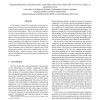Free Online Productivity Tools
i2Speak
i2Symbol
i2OCR
iTex2Img
iWeb2Print
iWeb2Shot
i2Type
iPdf2Split
iPdf2Merge
i2Bopomofo
i2Arabic
i2Style
i2Image
i2PDF
iLatex2Rtf
Sci2ools
131
click to vote
IPPS
2003
IEEE
2003
IEEE
ECO: An Empirical-Based Compilation and Optimization System
In this paper, we describe a compilation system that automates much of the process of performance tuning that is currently done manually by application programmers interested in high performance. Due to the growing complexity of accurate performance prediction, our system incorporates empirical techniques to execute variants of code segments with representative data on the target architecture. In this paper, we discuss how empirical techniques and performance modeling can be effectively combined. We also discuss the role of historical information from prior runs, and programmer specifications supporting run-time adaptation. These techniques can be employed to alleviate some of the performance problems that lead to inefficiencies in key applications today: register pressure, cache conflict misses, and the trade-off between synchronization, parallelism and locality in SMPs.
Accurate Performance Prediction | Distributed And Parallel Computing | Empirical Techniques | IPPS 2003 | Performance |
| Added | 04 Jul 2010 |
| Updated | 04 Jul 2010 |
| Type | Conference |
| Year | 2003 |
| Where | IPPS |
| Authors | Nastaran Baradaran, Jacqueline Chame, Chun Chen, Pedro C. Diniz, Mary W. Hall, Yoon-Ju Lee, Bing Liu, Robert F. Lucas |
Comments (0)

